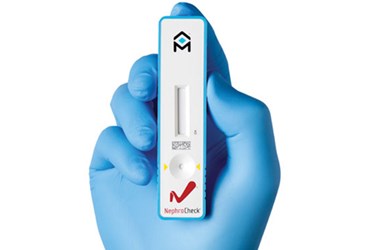FDA Green Lights First Device To Assess Risk For Acute Kidney Injury
By Nick Otto

The FDA recently allowed marketing for a first-of-its-kind device used in determining if certain critically ill, hospitalized patients have an imminent risk of developing acute kidney injury (AKI).
Astute Medical’s NephroCheck, cleared via a de novo premarket review, allows for closer patient monitoring, helping to prevent permanent kidney damage or death, the agency reported in a press release.
AKI is a sudden decline in kidney function following injury to the kidney — often with no symptoms — followed by “a co-existing disease, infection or other condition,” according to the press release. The condition can cause fluid buildup, chest pain, muscle weakness, permanent kidney damage or chronic kidney disease. High-risk, critically-ill patients most susceptible to AKI include the elderly and patients with diabetes or high blood pressure, the FDA notes.
While current products can only confirm whether a patient already has AKI, NephroCheck detects the presence of insulin-like growth-factor binding protein 7 and tissue inhibitor of metalloproteinases in the urine. Within 20 minutes, the device provides a score based on the amount of proteins present, the FDA says, and corresponds the information with the patient’s risk of developing AKI within the next 12 hours.
“Early assessment and timely treatment for AKI can help prevent kidney damage and potential associated complications,” Alberto Gutierrez, director of the Office of In Vitro Diagnostics and Radiological Health at the FDA's Center for Devices and Radiological Health, said in the press release. “The NephroCheck provides health care providers with a quick, validated method of assessing a patient's AKI risk status which may inform patient management decisions.”
The FDA based its decision on two clinical studies of more than 500 subjects at 23 hospitals. The device was accurately able to detect 92 percent of AKI patients in one study and 76 percent in the other, the FDA says. In both studies, NephroCheck gave a false-positive result in about half of the patients without AKI.
“The availability of biomarkers for AKI risk assessment can play a pivotal role in evolving practice from a ‘wait and see’ era to a ‘let’s prevent and treat it domain,’” Kianoush Kashani of the Mayo Clinic said in a statement. “Clinicians will be able to integrate the test with clinical information to improve decision-making, which aligns with the goal of offering better preventive care and earlier action.”
Image Credit: NephroCheck Test
